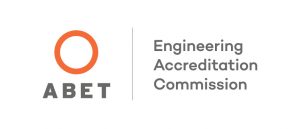Electrical & Computer Engineering Program Enrollment and Graduation Data
Program Enrollment and Graduation Data
The UMaine Office of Institutional Research annually compiles statistical data for all programs across campus. Enrollment and graduation data for all Engineering programs can be found using the following links:
Computer Engineering ABET Accreditation
The BS program in Computer Engineering is accredited by the Engineering Accreditation Commission of ABET, https://www.abet.org, under the General Criteria and the Program Criteria for Electrical, Computer Communications, Telecommunication(s) and similarly Named Programs.
Electrical Engineering ABET Accreditation
The BS program in Electrical Engineering is accredited by the Engineering Accreditation Commission of ABET, https://www.abet.org, under the General Criteria and the Program Criteria for Electrical, Computer Communications, Telecommunication(s) and similarly Named Programs.
Program Educational Objectives and Student Outcomes
Program Educational Objectives:
Within two to five years of graduation, graduates of the Electrical (Computer) Engineering program will:
- Demonstrate a solid foundation in electrical (computer) engineering by holding positions that utilize their engineering training, advancing in their job responsibilities, and/or be pursuing postgraduate education.
- Demonstrate the ability to function in the workplace through independent thought, problem solving, teamwork and effective communication.
- Be working as engineering professionals, acting ethically, adhering to standards and be committed to the welfare of employees and the general population.
- Participate in lifelong learning activities to continue their professional development.
ECE Student Outcomes
Upon successful completion of the Electrical or Computer Engineering programs, the student will have:
- an ability to identify, formulate, and solve complex engineering problems by applying principles of engineering, science, and mathematics
- an ability to apply engineering design to produce solutions that meet specified needs with consideration of public health, safety, and welfare, as well as global, cultural, social, environmental, and economic factors
- an ability to communicate effectively with a range of audiences
- an ability to recognize ethical and professional responsibilities in engineering situations and make informed judgments, which must consider the impact of engineering solutions in global, economic, environmental, and societal contexts
- an ability to function effectively on a team whose members together provide leadership, create a collaborative and inclusive environment, establish goals, plan tasks, and meet objectives
- an ability to develop and conduct appropriate experimentation, analyze and interpret data, and use engineering judgment to draw conclusions
- an ability to acquire and apply new knowledge as needed, using appropriate learning strategies.

Graduate School Accreditation
The Graduate School at the University of Maine is accredited by the New England Commission of Higher Education – NECHE. The Electrical and Computer Engineering graduate programs contribute to this accreditation through its ECE Graduate Program Learning Outcomes.
External Review
The ECE Department has an external advisory board to ensure that the programs remain responsive to its constituencies. These representatives are brought together annually to review the program’s mission statement and objectives, and to make recommendations for improvement of the program. They suggest changes to the department mission, objectives, and assessment procedures.
